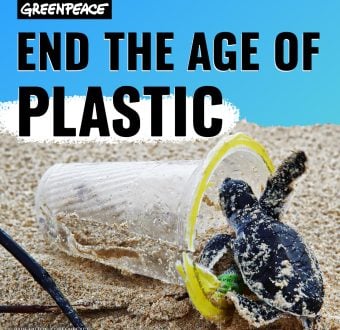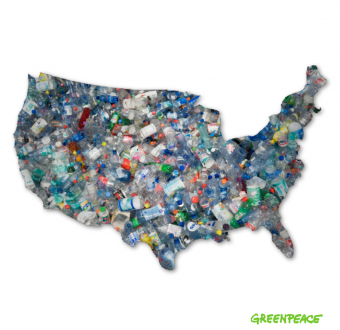Washington, DC – Greenpeace USA released its second ranking of 20 U.S. grocery retailers’ efforts to reduce single-use plastics today, finding that all of the supermarkets continue to fail to address the plastic pollution crisis. Giant Eagle, headquartered in Pittsburgh, was the top ranked retailer for its commitment to eliminate all single-use plastics by 2025, though additional action is needed to shift its operations toward reuse. Across the board, companies must prioritize plastic reduction efforts, engagement with suppliers, and transparency with customers and the broader public.
“U.S. retailers are moving at a snail’s pace on plastic reduction efforts,” said Greenpeace USA Oceans Campaign Director John Hocevar. “There is not a single place that individuals are confronted with more single-use plastic than in our grocery stores, yet these companies continue to drag their feet and offer excuses. We have seen more greenwashing than action. It is time to turn this around.”
ALDI, Sprouts Farmers Market, The Kroger Company, and Albertsons Companies rounded out the top five retailers in Greenpeace’s ranking. H-E-B was again the worst ranked retailer, as the company continues to fail to take any meaningful action on single-use plastics. Walmart, who Greenpeace Inc recently sued for deceptive recyclability labels on plastic products and packaging, fell to 7th in this year’s ranking. Trader Joe’s and Hy-Vee dropped the furthest, sliding nine spots each to finish 13th and 16th respectively.
Giant Eagle’s commitment to eliminate all single-use plastics from its operations helped move it ahead of ALDI, the top scorer in Greenpeace’s 2019 ranking. Giant Eagle is currently developing sustainable packaging guidelines for its suppliers.
“Every piece of plastic that comes through a grocery store ends up polluting our environment, harming our health, accelerating climate change, and impacting communities on the frontlines of this crisis,” Hocevar continued. “We need to see retailers acting now to dramatically reduce their plastic footprints and move from single-use packaging to reuse and package free approaches. Their customers want better options than retailers are giving them.”
Greenpeace obtained information from supermarkets through a standardized 21-question survey, email and phone conversations, and publicly available information. Supermarkets were scored on their performance on policy, reduction, initiatives, and transparency.
As consumer goods companies and retailers fail to act, pressure is mounting for federal action to tackle the plastic pollution crisis. Over 600 community and conservation groups have put forth a Presidential Plastics Action Plan with executive actions President Biden can take, and the comprehensive Break Free From Plastic Pollution Act is expected to be reintroduced in 2021.
The full retailer ranking can be found here: https://www.greenpeace.org/
###
Contact: Perry Wheeler, Greenpeace USA Senior Communications Specialist, P: 301-675-8766


